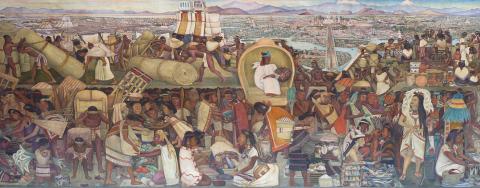
Mexico Month
From June 3rd to July 1st, Mexico Month will be held at Sorbonne University.
The event provides the opportunity to celebrate the history of Mexico, along with the friendships and collaborations that unite our university with the National Autonomous University of Mexico (UNAM).
Interview with Béatrice Perez, Vice-Dean of International Relations in the Faculty of Arts and Humanities, and Serge Fdida, Vice President of International Development at Sorbonne University
How did the idea for Mexico Month come about?
Béatrice Perez and Serge Fdida: The ties of friendship and collaboration between the National Autonomous University of Mexico (UNAM) and Sorbonne University are very old. They have been further strengthened, between 2017 and 2020, by the creation of the Alemán Chair. Focusing on the themes of pre-Hispanic Mexico, this chair, financed by the Miguel Alemán Foundation, operated initially within Paris-Sorbonne, then the Faculty of Letters of Sorbonne University. In February 2020, a delegation from our University and the National Museum of Natural History traveled to UNAM to expand our areas of cooperation. During a reception at the home of the Mexican ambassador in France, the idea of a Mexico Month was born to commemorate the major dates of Mexican history with our Mexican friends and colleagues.
Why a Mexico Month in 2021?
B. P.: Mexico is celebrating a series of emblematic dates this year:
- Seven centuries of history, that have shaped the cosmogony of Mexican culture since the mythical founding of Tenochtitlán.
- Five centuries since the capture of Mexico-Tenochtitlán by Hernán Cortés in 1521, giving birth, after the fall of the Aztec Empire, to a new culture forged in violence and interbreeding.
- Two centuries of independence and construction of the nation-state completed and recognized as of 1821. The links that bring together Sorbonne University and UNAM are such that it seemed obvious to us to retrace this history with them, to reread it, to explore it and to celebrate it.
Who are the main participants in this event?
B. P.: This event took shape thanks to the tenacious will of the University's international bodies and the dynamism shown by our teaching communities. The main actors are our colleagues, our students, our research teams, our academic departments, our laboratories: a sort of joyful Mexican march. The result is nothing less than our community’s appetite for intellectual exchanges with our Mexican guests and friends.
And its audience?
S. F.: This event is part of the internationalization of Sorbonne University, but also of our dialogue with society. In this way, it is for everyone: people who are curious, amateurs, neophytes, specialists, even interested passers-by. Unfortunately, the pandemic imposes public health measures to restrict the number of people who can attend the event. Caps on participants will therefore be set up.
B. P.: In virtual terms, we are inviting the Sorbonne University community and its Alliance, our Mexican friends from UNAM, Mexicans in Paris and France, friends of Mexico, students of the history of pre-Hispanic civilizations, of American cultures, of the history of Mexico. In short, since culture knows no borders, Mexico Month is a time of celebration for all.
What are your strategic goals?
S. F.: The goal is to celebrate our partnership with UNAM, to strengthen it, to emphasize to our Mexican friends how important these ties are to us.
B. P.: We also want to offer the city and society some cultural opportunities, which is also our role: to come together, to strengthen our sense of community and to give Sorbonne University its sense of uniqueness in action.
What events are included in the program?
B. P.: The program includes conferences and symposiums to highlight Mexico as a palimpsest of the world, poetic variations on Mexican poets, a concert, Mexican cinema in all its forms, a mineralogical exhibition, debates, presentations of books published for the Month of Mexico, presentations of existing and new academic programs, as well as signing agreements and conventions. In short, a festival of academic activities that will take place in person, virtually, in hybrid, in simultaneous translation and on all of our campuses.
What will be the follow-up?
S. F.: The focus on the Mexican academic world and UNAM will allow us to broaden and consolidate our joint cooperation actions, which will be more specific. This event will become a tradition for Sorbonne University, aiming each year to celebrate a country, its culture and the potential of the relationships we can develop with its academic world.
For more information
Visit the event's website (in French or Spanish.)
Illustration : Diego Rivera, La gran Tenochtitlán - Mural, 1945 - National Palace - Mexico
